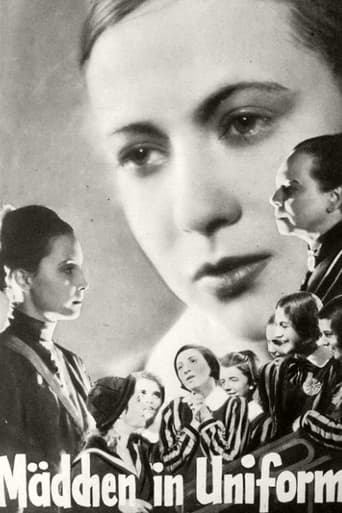Syl
What's a girl to do when she is surrounded by women in a female boarding school? She falls in love with her female teacher who shares some mutual feelings. This film is not so much about lesbianism as it is about Germany was striving to become so disciplined and unfeeling towards one another. Of course, lesbianism was bound to happen. There were no other options. You have a girl who wants to be loved and love just seems unthinkable in the German culture of the Nazi uprising. Even though this film was made in 1931, the girls' uniforms reminded me of the concentration camps uniforms. The school was trying to discourage close relationships between girls and among teachers and students. I don't think of it much as a lesbian film as a chilling portrait of how Germany was bounded for destruction during World War II. Maybe the film points as a good reminder of how relationships should be encouraged and feelings are human. This school was trying to restrict the girls' humanity into an almost robotlike existence. That's how I always saw this film. I never thought of it as a lesbian film because the girls in the school had no other choice or option. They weren't allowed freedom and that's what the major theme of this movie is. Germany was beginning to restrict it's freedom on their citizens and forcing them to become less human in order to succeed but that's just my opinion.
futures-1
"Maedchen in Uniform" (German, 1931): I viewed this film in an "unrestored" version, yet I was still fascinated by it on a number of levels. The photography was wonderful – with well thought out set shots full of light and dark diagonal patterns illustrating late Expressionism/early Art Deco, and close ups of the girls and women using equally beautiful lighting, often with soft focus filters. A little knowledge of Euro/German history was helpful – since this movie was banned in Germany (just prior to Hitler's coming into full power), and there is a lesbian angle to the story. (Yet, having lived in Europe, I was NOT prone to assigning every hand-holding, dance, or goodnight kiss to lesbianism.) The Prussian attitudes were represented by the older women still in power, and the "new" German attitudes were given to the young girls, the "hope" of the future. Germany couldn't have been in much more turmoil at the time, and was cranking up towards the war to make up for the last war, fascism, racial purification, intolerance, and an even deeper sense of conformity. This film is loaded with the era's "issues", and not necessarily supportive of where Germany was headed.
wedgwood
Filmed in pre-National Socialist Germany when the economy was at a true low. The girls at this Catholic boarding school are slight, pale, hungry creatures -for food and comfort. Daughters of soldiers, they are taught discipline and deprivation, not luxury. The girls, however, have more personality and strength of character than those in the majority of movies produced nowadays. Manuela is a highly emotional 14 year old 'new girl' who has no mother. She, like the rest of her classmates, yearns for the attention of the fair and beautiful Fraulein von Burnberg. Ilse is the school trouble-maker, leader, and clown. Witty and outspoken, she repeatedly entertains the other girls, binding them together in secret comradery against their oppressive elders. At an after-play function Manuela is the only student who can tolerate the taste of the punch given to them as a reward. Her friends pass their cups on to her and she soon gets herself quite drunk. In a semi-conscious state she announces her feelings for the popular Fraulein von Burnberg to the entire school along with the infuriated Headmistress. These girls are not all lesbians, they are merely children starved of human contact and love. As a result they throw their hearts at the open mind and kind heart of Frau von Burnberg. I found it surprising and beautiful how loyal the girls were to each other. There is very little rivalry or conflict among the students, a vast contrast to the modern representation of teens. Even when Manuela embarrasses herself horribly in front of the school, her classmates stick by her without hesitation. That's cool.
vm001k
Mädchen in Uniform This was a very bold film. It presents the controversies of lesbianism, teacher-student relationships, and antifascism in Germany in the 30's. The acting is of great quality. You don't need to know German to understand what's going on, even with out the subtitles. I find it interesting that feminine sexual powers are used throughout the film. The beloved teacher, Fräulein von Bernburg, uses her sexual powers to win the affection of the children, keeping them in check. During rehearsals for a play, one of the girls is told to use her feminine powers (to be more seductive) to play her part. Sex appeal is also mentioned in describing a movie star. The antifascism isn't blatant in the film, but in the opening scene, we see soldiers marching and then the schoolgirls marching, hinting at the hidden meaning. This film has a place in history and is worth seeing.





